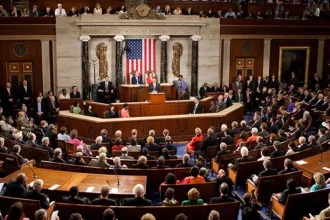Donald Trump addressed claims about his political alignment during a rally in Atlanta, explicitly stating, “I’m not a Nazi. I’m the opposite of a Nazi.” This clarification came amidst contentious political exchanges, particularly with Democratic candidate Kamala Harris, as they approach the closing week of a fiercely competitive presidential race.
At the rally, Trump responded to characterizations of him being akin to a modern-day “Hitler,” a narrative pushed by the Harris campaign. He refuted these claims in front of a lively crowd, stressing his difference in ideology and intent.
This issue was highlighted further by remarks made during a significant event he hosted at New York’s Madison Square Garden, which had faced criticism for racially charged comments from his associates. The gathering’s tone and content fueled ongoing debates about Trump’s views and his approach to leadership.
Adding to the controversy, a recent interview in The New York Times with Trump’s former chief of staff, retired general John Kelly, labelled the former president’s behaviour as fascist. Kelly’s comments, which included references to Trump’s alleged positive remarks about Hitler, have intensified scrutiny of Trump’s ideological stance.
Read: Trump Rallies at Madison Square Garden Amidst Controversy
The election’s tension is palpable, with concerns about potential post-election disputes similar to those in 2020, exacerbated by incidents like suspected arson affecting ballot security in Washington and Oregon.
Trump also faced backlash for derogatory comments made about Puerto Rico by a preliminary speaker at his New York rally, which his campaign later disclaimed. As the election nears, Trump continues to engage in sharp rhetoric against Harris and other political adversaries, framing them as national detriments and urging his supporters to vote against what he views as harmful political opposition.






